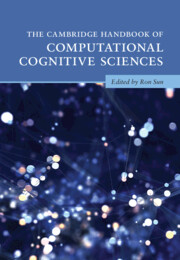Book contents
- The Cambridge Handbook of Computational Cognitive Sciences
- Cambridge Handbooks in Psychology
- The Cambridge Handbook of Computational Cognitive Sciences
- Copyright page
- Contents
- Preface
- Contributors
- Part I Introduction
- Part II Cognitive Modeling Paradigms
- Part III Computational Modeling of Basic Cognitive Functionalities
- 11 Computational Models of Categorization
- 12 Computational Cognitive Neuroscience Models of Categorization
- 13 Models of Inductive Reasoning
- 14 Analogy and Similarity
- 15 Mental Models and Algorithms of Deduction
- 16 Computational Models of Decision Making
- 17 Computational Models of Skill Acquisition
- 18 Computational Models of Episodic Memory
- 19 Computational Neuroscience Models of Working Memory
- 20 Neurocomputational Models of Cognitive Control
- 21 Computational Models of Animal and Human Associative Learning
- 22 Computational Cognitive Models of Reinforcement Learning
- Part IV Computational Modeling in Various Cognitive Fields
- Part V General Discussion
- Index
- References
15 - Mental Models and Algorithms of Deduction
from Part III - Computational Modeling of Basic Cognitive Functionalities
Published online by Cambridge University Press: 21 April 2023
- The Cambridge Handbook of Computational Cognitive Sciences
- Cambridge Handbooks in Psychology
- The Cambridge Handbook of Computational Cognitive Sciences
- Copyright page
- Contents
- Preface
- Contributors
- Part I Introduction
- Part II Cognitive Modeling Paradigms
- Part III Computational Modeling of Basic Cognitive Functionalities
- 11 Computational Models of Categorization
- 12 Computational Cognitive Neuroscience Models of Categorization
- 13 Models of Inductive Reasoning
- 14 Analogy and Similarity
- 15 Mental Models and Algorithms of Deduction
- 16 Computational Models of Decision Making
- 17 Computational Models of Skill Acquisition
- 18 Computational Models of Episodic Memory
- 19 Computational Neuroscience Models of Working Memory
- 20 Neurocomputational Models of Cognitive Control
- 21 Computational Models of Animal and Human Associative Learning
- 22 Computational Cognitive Models of Reinforcement Learning
- Part IV Computational Modeling in Various Cognitive Fields
- Part V General Discussion
- Index
- References
Summary
This chapter begins with an outline of logic and of the attempts to use it as a theory of human deduction. The fatal impediments to this approach led to the model theory in which models based on the meanings of premises yield deductive conclusions. And the chapter describes in detail the implementation of this theory’s account of deductions based on sentential connectives such as “if,” and how this simulation led to the discovery of systematic but compelling fallacies.The chapter outlines how algorithms based on models simulate deductions of the spatial relations among objects. And it points out the problems that need to be solved to extend accounts of elementary inferences from quantified assertions to deal with multiply-quantified relations. One alternative to the model theory is the idea that human deduction relies on probabilities. This approach concerns only which inferences people make, not the underlying mental processes by which they are made. The model theory fills the gap, because it applies to the deductions of probabilities, both those based on frequencies or proportions, and those based on evidence pertinent to unique events. The chapter ends with an account of why theories of human deduction need to be simulated in computer programs.
- Type
- Chapter
- Information
- The Cambridge Handbook of Computational Cognitive Sciences , pp. 474 - 498Publisher: Cambridge University PressPrint publication year: 2023
References
- 1
- Cited by

